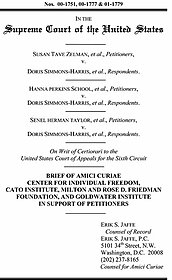Learn more about Cato’s Amicus Briefs Program.
In response to the failure of many public schools in its poor urban center, the city of Cleveland, Ohio, established the Pilot Project Scholarship Program. In this program, students chosen by lottery were provided with tuition vouchers of up to $2,250 per year to use at participating public and private schools. As a result of this program, 96% of participating students enrolled in religiously affiliated schools, and the program was subsequently challenged as violating the Establishment Clause of the First Amendment. Cato’s brief, joined by the Center for Individual Freedom, the Goldwater Institute, and the Milton and Rose Friedman Foundation, argues that if genuine choice exists between secular and religiously affiliated institutions within a school voucher program, there is no Establishment Clause violation. Here, given the existence of viable alternatives, including public schools with additional tutoring, magnet schools, and community schools, parents were fully able to make genuine choices uninhibited by government influence. Indeed, the program’s criteria were facially neutral and served a valid goal of enhancing educational options and increasing the return on government funding.

This work is licensed under a Creative Commons Attribution-NonCommercial-ShareAlike 4.0 International License.

